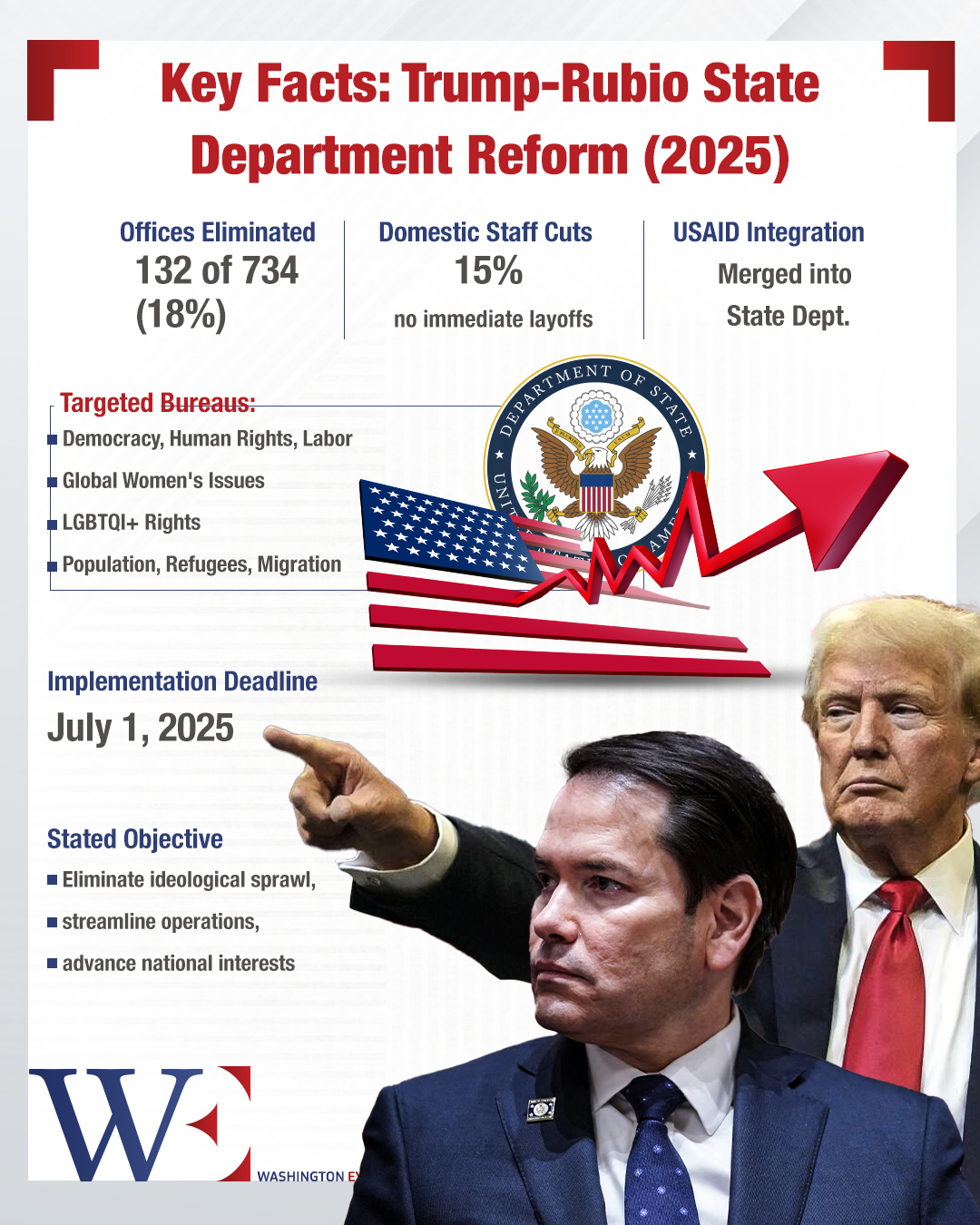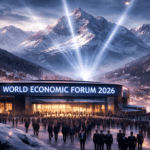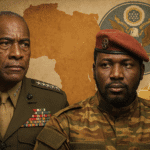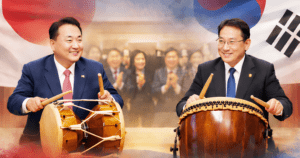In a bold and controversial move emblematic of the Trump administration’s “America First” doctrine, Secretary of State Marco Rubio has unveiled a sweeping reorganisation of the U.S. State Department. The proposal, part of a broader executive order still being finalised, would eliminate 132 of the department’s 734 offices, restructure or close multiple bureaus, and significantly cut domestic staffing by 15%. The changes are being framed by the administration as a long-overdue overhaul aimed at streamlining operations and eliminating what it sees as ideological excesses within America’s diplomatic corps. But as the dust settles, questions arise: Is this a necessary bureaucratic correction, or yet another sign of America’s withdrawal from global leadership?
The reorganisation, championed by Secretary Rubio and backed by President Trump, targets what the administration describes as an “ideological sprawl” within the State Department. Offices that promote democracy, gender equity, LGBTQ+ rights, and refugee support have come under scrutiny, with several on the chopping block. Rubio was unapologetic in outlining the administration’s rationale. “For too long,” he stated, “our foreign policy apparatus has operated independently of the public interest, pursuing niche ideological projects rather than advancing our national security and economic interests.”
Part of the plan involves folding the U.S. Agency for International Development (USAID) into the State Department—dissolving a decades-long tradition of development work that functioned separately from political diplomacy. The Bureau of Democracy, Human Rights, and Labor (DRL), along with the Office of Global Women’s Issues and the Office of the Special Envoy for LGBTQI+ Rights, are likely to be merged or disbanded entirely. According to a leaked draft of the executive order, the administration views these offices as perpetuating a form of diplomacy that “distorts American values through ideological evangelism.”
The reorganisation may appeal to Trump’s political base, which sees U.S. foreign aid and democracy promotion as misused or irrelevant. But for many in the diplomatic community and among America’s allies, the changes could herald a retreat from the international stage. The impact will likely be felt differently across various regions.
Africa stands to be particularly affected. U.S. support for civil society, democratic governance, and anti-corruption initiatives has been central to its engagement on the continent. These programs, often housed within the DRL and USAID, have provided essential funding for elections monitoring, judicial reform, and local journalism. Curtailing or eliminating them may create a vacuum easily filled by China and Russia, whose influence in Africa continues to grow. If America steps back, Beijing and Moscow are poised to step forward, offering infrastructure and military support with far fewer conditions.
In the Middle East, the effects could be double-edged. On one hand, reducing America’s involvement in contentious ideological efforts may help improve relationships with conservative regimes that have long viewed U.S. human rights initiatives as intrusive. On the other hand, a diminished role in human rights advocacy may alienate reformist elements and civil society actors in countries such as Lebanon, Jordan, and Tunisia. Furthermore, folding refugee support into a narrower national security framework could undercut efforts to stabilise regions affected by conflict, especially in Syria and Yemen.
In Europe, the realignment is likely to ruffle feathers. European Union leaders have traditionally partnered with the United States on issues such as democracy promotion, gender equality, and human rights. If Washington steps back, Brussels may feel compelled to fill the void—without the global reach or resources to do so at the same scale. The move also risks diminishing U.S. credibility within NATO, where soft power has always been a critical complement to military alliances.
In the Western Hemisphere, relations with Canada and Mexico could become more transactional. Human rights, environmental diplomacy, and indigenous issues have been key areas of U.S.-Canada cooperation. Dismantling the offices responsible for these could hinder bilateral dialogue on issues such as Arctic sovereignty and climate action. With Mexico, the shift could further strain ties already frayed over migration and trade disputes. If the State Department’s engagement becomes more narrowly focused on border security and counternarcotics, it may miss broader opportunities to address root causes of migration and violence.
Supporters of the overhaul argue that it reflects a necessary realignment of U.S. foreign policy toward realism. They claim that the current structure, born of the post-Cold War era, is outdated and overly expansive. Critics, however, warn that gutting the State Department of its developmental and human rights arms weakens America’s global influence and moral authority.
The concern isn’t just about values. It’s also strategic. Diplomacy is about leverage, and America’s ability to project soft power has been one of its most effective tools. Reducing America’s global engagement, particularly in areas involving soft power, could erode the networks and partnerships built over decades.
Rubio has promised that the reorganisation will not result in immediate layoffs, and that “American diplomats will remain the best-trained, most effective professionals in the world.” But with 132 offices on the chopping block and significant internal consolidation ahead, the effects are likely to be profound. The proposed changes are set to be implemented gradually, with a July 1 deadline for the internal working group to finalise its plan.
This reorganisation is not happening in a vacuum. It comes as tensions with China escalate over Taiwan and trade, as Russia continues its war in Ukraine, and as unrest mounts across the Global South. At a time when global trust in American leadership is already precarious, the optics of scaling back the diplomatic apparatus may embolden adversaries and unnerve allies.
Domestically, the move plays well among Republicans who see the State Department as a bastion of liberal activism. For Rubio, long seen as a traditional foreign policy hawk, this role is a political reinvention—one that brings him in step with the MAGA base while advancing his influence within the Trump administration.
Some critics see the overhaul as ideologically driven sabotage. “This is not about reform,” wrote one former State Department official on X. “It’s about silencing dissent and reshaping foreign policy into a partisan weapon.”
The proposed overhaul of the State Department reflects a deeper philosophical divide about what America’s role in the world should be. Is the purpose of diplomacy to promote universal values and global cooperation? Or is it to focus narrowly on strategic and economic interests, regardless of their moral implications?
For the Trump administration, and for Rubio, the answer is clear. This is a reorientation, not a retreat. But for many outside of the administration—and beyond America’s borders—it feels very much like an abdication of leadership.
As the plan moves toward implementation, diplomats, lawmakers, and global observers will be watching closely to see whether this is a genuine recalibration of U.S. diplomacy—or a short-sighted step toward global disengagement.
















